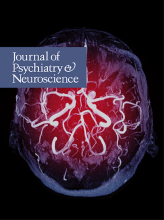We appreciate the response of Polasek and colleagues1 to our hypothetical case summary on pharmacogenetics in first-episode psychosis. They raise a pertinent issue on how the term “treatment failure” used in pharmacogenetic parlance differs from its everyday clinical use. They point to our reference to the study by Jukic and colleagues, 2 which defined “treatment failure” as a need to switch treatment and observe that this end point likely happened owing to both poor efficacy and increased adverse effects.
Our case report highlights clearly that all 3 drugs in question — aripiprazole, risperidone and haloperidol — resulted in greater adverse effects, resulting in discontinuation (i.e., failure of the intended treatment). When treating first-episode psychosis the efficacy of most commonly used antipsychotic agents appears comparable and becomes apparent at lower median doses than what is used in chronic schizophrenia. 3 When treatments fail to improve the outcomes, this is mostly because patients are not able to continue with the treatment owing to adverse effects.4 As such, the ultimate treatment choice is made on the basis of tolerance rather than efficacy. In a similar vein, for a clinician treating first-episode psychosis, the need for pharmacogenomic testing is likely to arise mostly on the basis of adverse effects rather than poor efficacy at high doses, providing the rationale for the context in our hypothetical case report.
The statement “risperidone is likely to be too slowly converted to its active metabolite” should not be taken to mean that risperidone itself is not an active moiety. The response by Polasek and colleagues indeed reiterates our intended meaning, should a reader require such clarification.
We agree with the need for precision in terminologies when measuring an outcome. The descriptive phrases suggested by Polasek and colleagues — “unexpected poor efficacy” and “intolerable adverse effects” — are likely to be more useful as they both contribute to the lack of the desired treatment outcome. In fact, we highlight both of these as factors that call for pharmacogenetic testing in a patient with first-episode psychosis in our original report. We take this opportunity to highlight that these 2 phenomena are not mutually exclusive, at least in the first episode clinical setting, where patients cite both as prominent reasons for their decisions to discontinue treatment.4,5
Footnotes
Competing interests: P. Sabesan has received speaker fees from Lundbeck Canada. L. Palaniyappan is coeditor in chief of JPN but was not involved in the review of or decision to accept the manuscript for publication. He has received personal fees from Janssen Canada, Otsuka Canada, SPMM Course Limited UK, and the Canadian Psychiatric Association; book royalties from Oxford University Press; and investigator-initiated educational grants from Sunovion, Janssen Canada and Otsuka Canada. No other competing interests were declared.
This is an Open Access article distributed in accordance with the terms of the Creative Commons Attribution (CC BY-NC-ND 4.0) licence, which permits use, distribution and reproduction in any medium, provided that the original publication is properly cited, the use is noncommercial (i.e., research or educational use), and no modifications or adaptations are made. See: https://creativecommons.org/licenses/by-nc-nd/4.0/






